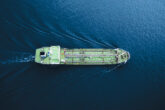September 23, 2019
The Most Dangerous Moment of the Trump Presidency
For all of the uncertainty of the Trump administration’s nearly three years in power, genuine international crises have been rare. That’s changing right now. The attack a week ago on Saudi Arabia’s massive Abqaiq oil field took offline half of the country’s oil production – some five percent of global output. The drone and missile salvo has the hallmarks of Tehran, and with top administration officials pointing to Iranian culpability, the world is watching to see if and how the United States responds. It’s the most dangerous moment of the Trump presidency thus far.
Not so long ago, a devastating attack on Saudi oil supplies would have almost certainly elicited an American military response. Ensuring the continued flow of energy from the Middle East was widely seen as critical, one of the vital American interests that nearly all policymakers believed worth defending. Fracking and the reduced U.S. dependence on Middle East oil, the exhaustion and caution borne of two decades of American wars, a new focus on great power competition, and the complexities of recent diplomacy with Iran have changed all this to a degree.
But only to a degree. Oil prices spiked after the Abqaiq attack, and while they have settled down for now, a new assault could roil them again and harm the American economy. The U.S. defense of Gulf allies, while enshrined in no mutual defense treaty, has been a general feature of America’s approach to the region since at least the first Gulf War. The attack on Saudi critical infrastructure was inarguably the kind of military aggression Washington wishes not to see repeated. And it follows a summer of hostile actions against tankers in the Gulf of Oman and the shooting down of an American drone.
Read the full article in The Atlantic.
More from CNAS
-
Russia in the Middle East with Jonathan Lord and Hanna Notte
One year after the October 7 attacks by Hamas, the crisis in the Middle East has grown more and more complex. With the region teetering on the brink of broader conflict, the B...
By Jonathan Lord, Hanna Notte, Andrea Kendall-Taylor & Jim Townsend
-
Biden Urges Israel Not to Attack Iran Nuclear Sites
Rachel Ziemba joins Bloomberg Television to discuss oil rising for a third day as traders watch for supply risks in the Middle East. Watch the full episode from Bloomberg Tel...
By Rachel Ziemba
-
The Fury of History
Even manifestly unpopular regimes do not end on their own. There has to be a trigger....
By Robert D. Kaplan
-
The Axis of Upheaval
The West has been too quick to dismiss the coordination among China, Iran, North Korea, and Russia....
By Andrea Kendall-Taylor & Richard Fontaine




